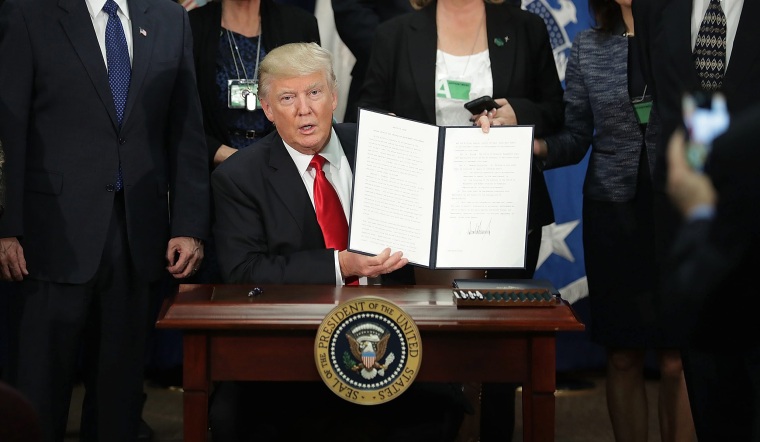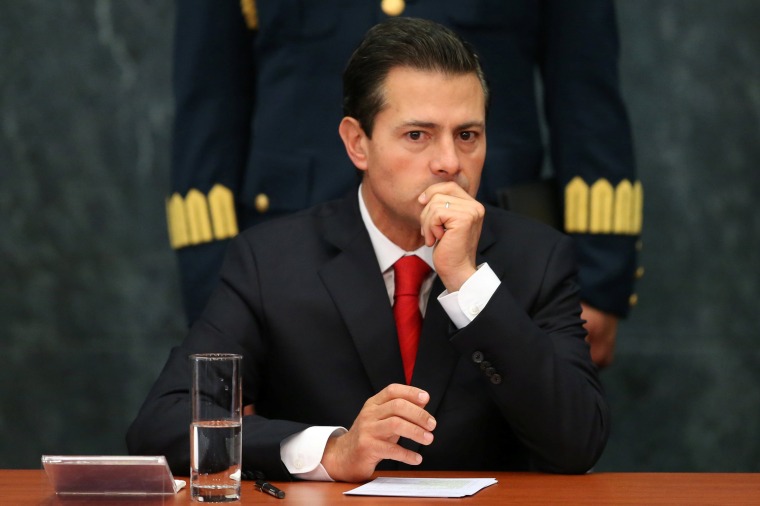If the Trump administration follows through on its proposal for a 20 percent tariff on Mexican imports, the result could be devastating for Mexico’s economy. But with more than two decades of tightly intertwined economic fortunes between the two countries, the ripple effects would hurt American companies and workers, too. At its worst, the fallout could increase illegal migration.
“The Mexican economy has been taking a big hit from this anti-Mexico rhetoric for a while now," said Monica DeBolle, a senior fellow at the Peterson Institute for International Economics. "It’s intensified, obviously, in view of what’s happened. The peso has been reflecting everything Mr. Trump said about Mexico.”
How Low Can the Peso Go?
Experts say it’s hard to guess how much further the peso, which last week touched near-record lows against the dollar, could fall.
Related: What About my Guacamole?
“A major driver in volatility has to do with the uncertainty of the actual policy that will prevail,” said Gerardo Rodriguez, managing director and portfolio manager for the emerging markets group at BlackRock. “By articulating policy just by sort of superficial statements or even tweets, what that implies is that the range of potential outcomes is very wide… All this uncertainty gravitates to Mexican asset prices,” he said.
“This is creating macroeconomic problems in Mexico,” DeBolle warned. Already, the International Monetary Fund revised its projection of Mexican growth down to 1.7 percent for 2017 after a 2.2 percent increase last year, citing “increased headwinds from U.S.-related uncertainty in Mexico.”
A Mexican Recession?
The prospect of a Mexican recession would have repercussions beyond economics. A September Pew Research report found that the number of undocumented immigrants coming into the United States had stabilized after nearly two decades of increases, and the Migration Policy Institute finds that more Mexicans have been leaving the U.S. than coming in recent years.
A crisis in Mexico could reverse that trend. Shuttered factories and a devalued peso could drive more Mexicans to come north for work. If the Mexican economy falters badly enough that its national security is compromised, the U.S. could see a growing number of migrants seeking safety, as well. And without help from their counterparts in Mexico, American border patrol and law enforcement agencies would have a more difficult and dangerous time keeping out drugs and criminals.
Related: American Car Buyers Will Pay the Price for a Mexico Tariff
Already, just the threat of punitive tariffs or a trade war have some companies hitting pause on Mexican production or plant expansion, and the impact isn’t stopping at the border. “It has a chilling effect on investing and commercial trade in the area,” said Jon Barela, CEO at Borderplex Alliance.
American Businesses Already Feeling the Pain
Although much of the conversation around Trump’s wall centers around illegal immigration, Barela pointed out that residents on both sides of the U.S.-Mexico border travel back and forth regularly for leisure as well as business. Retail, restaurants and other commercial activity in border cities like El Paso, Texas, is already being hurt, he said.
“The peso does not buy as much and businesses on the U.S. side of the border are starting to feel that,” he said. “It’s much more expensive now for a Mexican citizen to come over and purchase a pair of jeans in the U.S.”

Barela added that it wouldn’t take long for the contagion to spread to the American heartland, thanks to international supply chains. If a Mexican plant is shuttered, then the American workers who produced the raw materials or components for that factory also lose out.
“Midwestern states would also lose in a big way,” he said. “Their states too are heavily reliant on trade with Mexico… They don’t see it maybe as directly as we do on the border, but just because the states are further removed, doesn’t mean they’re further removed by employment.”
Others agreed that Trump could inadvertently hurt American output and employment in his bid to punish Mexico. “It would be extremely disruptive to an awful lot of U.S. multinational corps that have built production networks that go back and forth across the border with Mexico,” said Barry Bosworth, senior fellow of economic studies at the Brookings Institution. “U.S. companies have invested over $100 billion — all those investments would come undone if he did this… The rebound back on US employment is not good.”
A Pyrrhic Victory?
International relations experts also say Trump is courting a political morass by inflaming Mexican anger against the U.S. Mexico holds elections this year, and the populist far-left candidate Andrés Manuel López Obrador has been gaining ground by feeding into the Mexican public’s anti-Trump sentiment. “His rhetoric is very populist — old-fashioned, leftist, populist message,” DeBolle said. “Ever since this anti-Mexican rhetoric has been gaining ….we’ll see an even bigger shift,” she predicted.
“It plays right into left-wing candidates in Mexico like López Obrador who are openly hostile to the U.S. I’d think the Trump administration’s worst nightmare would be to have López Obrador as president,” Barela said. “Populism can cut in two different ideological directions.”
